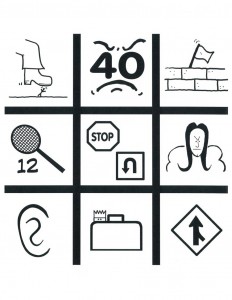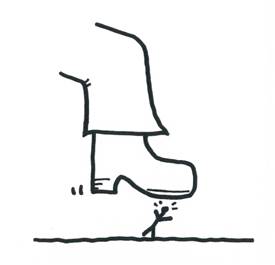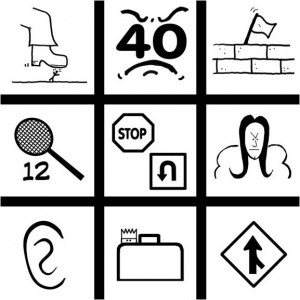 Joshua began the attack by crossing the Jordan River. The priests stepped into the river with the Ark of the Covenant and the water stopped flowing, creating a path for the whole community. After crossing the river, Joshua told his people to pull large rocks out of the river bed and to place them on the shoreline. These rocks would remind them to tell future generations how God had provided that day.
Joshua began the attack by crossing the Jordan River. The priests stepped into the river with the Ark of the Covenant and the water stopped flowing, creating a path for the whole community. After crossing the river, Joshua told his people to pull large rocks out of the river bed and to place them on the shoreline. These rocks would remind them to tell future generations how God had provided that day.
God appeared to Joshua and gave him marching orders for conquering Jericho. God had waited over 400 years for the people living in Canaan to turn from their unmentionable wickedness. God gave them one final chance to straighten up, as they (Joshua’s army) encircled them. Joshua and his men were told to walk around the city for seven days. Then, on the last day, they marched around it seven times. They were to stop, yell, blow trumpets and watch as God brought down the walls. The horns were blown. The people yelled. The walls came tumbling down. God warned them not to take any of the money in the rubble. The treasures in this city were considered unclean, used to exploit the innocent, women, and the poor. Most of the people obeyed, but greedy Achan did not.
Rahab and her family were rescued. They were the only ones in Jericho to repent and trust God that day. Despite being a prostitute and a foreigner, the faithful Rahab would later appear in the family tree of the Messiah, the Final Forgiver. This reminds us that God welcomes, forgives, and draws near to anyone who will trust Him. Basking in the victory at Jericho, Israel prepared for its next battle, which was against a tiny city called Ai. The city was so small that Joshua only sent a handful of soldiers to take it. His men returned days later, having been soundly beaten. Joshua was shocked. He prayed, asking why they had lost the battle. God told Joshua that someone in their community did not trust Him and had taken accursed objects from Jericho. Joshua called the multitudes of Israelites together and, through a process of elimination, discovered that Achan “stole the bacon” (well, maybe not bacon, but gold doesn’t rhyme with his name). Achan admitted his thievery. After Joshua dealt with Achan, the soldiers conquered Ai the next day in a great victory. The battles continued throughout the Canaanite land for several more years. One battle was so fierce that Joshua became worried they would run out of daylight before conquering their enemies. So he prayed. In response, God kept the sun lit for an extended period so they could finish the battle. That day became known as not only the longest day, but also the day God listened to the voice of a man. (Some scientists believe God may have refracted the light in order to extend the daylight, while others see it as miraculous.)
The battles continued, recorded in the book of Joshua, through chapter 12. The land was divided up among the twelve tribes of Israel. Each of the last twelve chapters of Joshua outlines which tribes and families received their part of the Promised Land. Joshua ends the book with a powerful sermon. Imagine Joshua holding up a tennis racket as he spoke. He called these twelve tribes to “serve God.”
The stirring sermon reminded them of their pattern of slipping away from God. He challenged them to instead serve with their whole heart. He declared that, regardless of what each person decided to do, “As for me and my house, we will serve the Lord!” And the people enjoyed God’s blessing and forgiveness for many years – until the time of the Judges. God’s people had their long-awaited Promised Land. They had God’s blessing; but their old, selfish tendencies crept back into their hearts. He sent judges, prophets, and even kings to repeat one resounding theme: “Stop running and return to Me!” God’s relentless pursuit of His people was amazing. He chased down these disobedient children time and time again. He loved them anyway.
We now enter the era of the Judges, a time when everyone did what was right in their own eyes. Over the next 350 years, God’s people went through the same cycle …they rebelled and ran from God. Distanced from their Father God, they became vulnerable, and foreign nations, like the Philistines, came into the land and conquered them. When the pain got too much, the people would scurry back and cry out to God for help. He listened each time and sent a judge (a military leader of sorts — preacher, adjudicator and general all in one) to deliver them from the foreign threat. The people would come back and enjoy prosperity. After things improved, they would begin trusting their money or power and feel like they didn’t need God anymore. They began to run away from Him again. They would tell God to go away. The Judges came from different backgrounds, with different personalities but a common message: “Stop running and return to Me!”
 One judge was a man named Gideon. He was a reluctant leader, a coward who lived in fear his whole life. God asked Gideon to trust Him and help return the nation of Israel. Gideon asked for many supernatural signs to confirm the message. He challenged God with silly tests. “Can You make the ground wet and the fleece I lay on the ground dry tomorrow? Can You reverse that the next day?” Despite Gideon’s fearful need for signs, God graciously answered his prayers. The judge then agreed to trust and built his army in an unusual way. He sent all the scared soldiers home …retaining only 300 to fight against the massive Midianite army. Gideon led his small team into battle in the dark of night, armed only with torches and clay pots. They surrounded the enemy camp and Gideon blew his trumpet. The startled enemy woke that night to the sound and saw torches glowing all around them. The groggy and disoriented Midianites panicked and killed each other, providing victory for “the Lord and Gideon.” God delivered His people and forgave their lack of trust. (Trusting God always means following His example — loving others, pursuing good, turning from evil.) When they obeyed Him, they were showing their trust, acknowledging that His ways were better than their ways. Real obedience always flows from genuine trust in God. After the Israelites’ proclamation of trust, they were liberated from slavery to the Philistines.
One judge was a man named Gideon. He was a reluctant leader, a coward who lived in fear his whole life. God asked Gideon to trust Him and help return the nation of Israel. Gideon asked for many supernatural signs to confirm the message. He challenged God with silly tests. “Can You make the ground wet and the fleece I lay on the ground dry tomorrow? Can You reverse that the next day?” Despite Gideon’s fearful need for signs, God graciously answered his prayers. The judge then agreed to trust and built his army in an unusual way. He sent all the scared soldiers home …retaining only 300 to fight against the massive Midianite army. Gideon led his small team into battle in the dark of night, armed only with torches and clay pots. They surrounded the enemy camp and Gideon blew his trumpet. The startled enemy woke that night to the sound and saw torches glowing all around them. The groggy and disoriented Midianites panicked and killed each other, providing victory for “the Lord and Gideon.” God delivered His people and forgave their lack of trust. (Trusting God always means following His example — loving others, pursuing good, turning from evil.) When they obeyed Him, they were showing their trust, acknowledging that His ways were better than their ways. Real obedience always flows from genuine trust in God. After the Israelites’ proclamation of trust, they were liberated from slavery to the Philistines.
Nevertheless, the cycle of running continued. God sent judges like Deborah, Jephthah, Jotham, and others to draw the people back to Him. God worked through each of the Judges despite their own flaws and issues. Each one provided a great victory with the battle cry, “Stop running and return to Me!” Returning to God was a far deeper issue than merely going through rituals and religious motions. Returning meant loving Him with heart, soul, and mind. It meant being in a trusting relationship with their Heavenly Father and acting according to His guidance and will. The people trusted briefly, but sadly returned to the same cycle again and again. In this age where everybody “did what was right in their own eyes,” some of the Judges themselves ran from God. Samson was a classic example of a running leader and disobedient Judge.
Samson was a fierce and confident Judge, known for his long hair and great strength. His long locks were not magic, they were merely a symbol of a promise he made to trust God. Samson had agreed to follow the Nazarite vow, a pledge to not cut his hair or touch anything dead. Eventually, Samson broke his vows, and his life serves as a case study in unbridled ego, lust, and revenge. Instead of conquering the Philistines, he decided to marry one, simply because she was beautiful. During the wedding ceremony, Samson lost his temper and stormed off. He went to visit prostitutes in the Philistine’s main city. There, the people tried to lock him in, but Samson tore off the city gate, carried it many yards, and threw it down the road. He made other headlines with feats of strength and anger. Samson once killed a lion with his bare hands and took on the whole Philistine army with only a donkey’s jawbone as a sword.
The Philistines concocted a plan to stop Samson. They convinced Delilah, a good-looking Philistine woman, to seduce him and figure out the “secret” of his might. Falling prey to Delilah’s nagging and manipulating, Sampson revealed that his long hair – the symbol of his vow to God — was his secret. One night he fell asleep and Delilah chopped off his hair. God’s patience with Samson’s rebellion came to an end. He removed Samson’s strength. The Philistines blinded him and made him work like a horse …for years.
They took him to their temple and paraded him around like a show pony. It was here that Samson finally got God’s message to “Stop running and return to Me!” Samson realized that he had been running his whole life with drunkenness, pride, anger, and lust. In that moment, he was humbled and asked God for forgiveness. He chose to return, and God restored the Judge’s great strength, allowing him to knock over the entire Philistine temple and delivering His people into independence.

